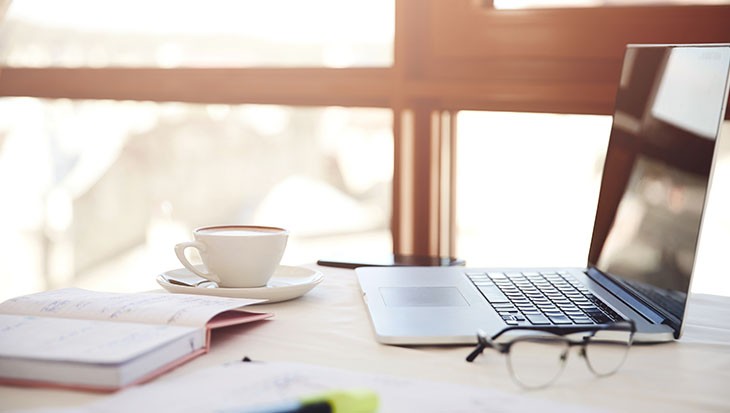Making your environment work for a better you
Is your living or working environment empowering or energy-draining? Read on to find out the small changes you can make today.


Hannah Young
Language Editor, The Young Vision
She graduated from the UK with a BSc in Psychology and MSc in Anthropology, and is a member of The British Psychological Society.
Is your living or working environment empowering or energy-draining? Read on to find
out the small changes you can make today.
This issue’s cover story, ‘Moving On’, is all about making positive changes to help you put one foot in front of the other as we cautiously step out of last year’s Covid-19 crisis and
move on to rebuild our normal lives. But one thing you may not have thought about whilst you make positive changes and set yourself some goals, is your environment. It’s important to be mindful of the immediate environment you create for yourself – whether you’re enjoying some downtime or working hard on a project. Get it right, and your environment will empower you. Get it wrong, and you can be left wondering why you feel drained of energy.
Since the dawn of human existence, we humans have been sensitive to our surroundings. In order to survive, we have placed ourselves in environments that have offered safety and security. We have found homes in environments that meet our needs for water, food and shelter. From the early days of man, access to such necessities has obviously become a lot easier and more convenient, and (thankfully), we no longer have to worry about finding shelter from predators! However, that innate need for security and comfort in our surroundings still lives inside of us. What’s more, with our complex social lives and constant stimulation, our environment now also must offer us something else – spaces that are psychologically comfortable.
What difference does the environment make?
Believe it or not, our living and working environment can have an impact on mood, stress, motivation, behaviour and even interactions between people. Think about the last time you stepped foot inside a hotel lobby. It was probably a large, open space with comfortable chairs carefully arranged to encourage a welcome sit down after a long journey. Did you allow yourself a deep breath and an ‘ahhhhh’ as you entered? Well, that was exactly the designer’s intention! Then think about a visit to your doctor or to the hospital – what colour are the walls? How bright is the light? Would a hospital or doctor’s clinic look clean and hygienic if the light was dim and the walls were painted brown, for example? These simple design choices really do dictate how we feel about a space, and how we respond within it.
Creating a comfortable environment at home
When we’re at home, we crave a few, simple things – comfort (whether that’s temperature or cosy furnishings), familiarity and security. Starting with a small space (your bedroom, for example), here are a few tips to help maximise your environment for relaxation and comfort.
Clear the clutter.
- The first thing to get started with is having a really good clear out. You’re going to need to clear away ‘visual clutter’ – those bits and pieces you have lying around that don’t really have a proper place to be tidied away to. But if you start with these, you’ll usually find you need to create some space in cupboards and drawers first. So, see what you can sell on or give away so that you’re starting with a clear and clutter-free canvas. Invest in some attractive storage boxes that will encourage you to keep good habits.
Think about temperature.
- Are you getting enough ventilation in your room, without creating cold draughts? Think about the temperature under-foot, too. You might want to invest in a nice thick rug to step out of bed onto on cooler mornings.
Think of your senses.
- Choose colours that appeal to you and calm you (although colours do have associations with various moods, it’s important to choose what appeals to you personally). If you can’t re-decorate, could you choose a new throw and pillows for your bed?
Think also about smell
- You might want to treat yourself to an oil diffuser or some scented candles – lavender is perfect for rest and sleep.
Bring nature in.
- Look at buying yourself a couple of plants, particularly those that help to purify the air. Also, look at your curtains – are they blocking natural light from the window, even when they’re drawn? Does the sun flood the room in the morning, helping to wake you up? Is it dark enough at night? Addressing the light in your room with help you to get a really good night’s sleep and wake up feeling fully rested.
An empowering workspace
It may be that your workspace is a corner of your bedroom, but the following principles can still apply. If you do study in your bedroom, make sure you keep to the designated study area. You can even paint part of the wall around your desk to really differentiate your office space from the rest of your room. Whatever you do, don’t be tempted to work in bed!
To counteract all that time spent staring at screens.
- Try to set up your work space close to a window. This way, each time you take a short break you can look off into the distance. If this isn’t possible, buy yourself a small plant to put on your desk, or choose a painting of a landscape you love to hang on a nearby wall.
Choose furniture carefully.
- If you can, invest in a quality office chair (preferably an adjustable one) to ensure your posture is good whilst you’re working away. If you can’t do this, experiment with placing cushions on your chair or behind your back, and raise your laptop or desktop screen by piling books underneath.
Experiment with light.
- Natural light is great, of course, but if your workspace is naturally quite dark, think about adding different forms of light. Maybe try a floor lamp next to your desk, rather than a desk lamp right next to your screen. If you can, choose warm white lightbulbs, rather than cool light.
Choose energising scents.
- Peppermint and citrus scents are great for stimulating and invigorating. So, if you have a diffuser, pop these scents in during your working day. Or, keep an essential oil mix handy to dab on your pulse points through the day.
Once you’ve established your best environment in your own bedroom space, think about other places in the home that you could make small adjustments to. Can you clear the kitchen of clutter to encourage others to keep surfaces tidy? Does your lounge space encourage quality family time or for everybody to be on their screens? Small changes can make a big difference to how we live within a space – give it a go and see!
